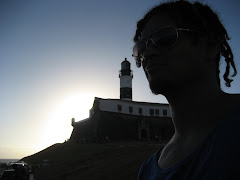food for thought:
Too often the pictures we paint of the world overlook the indigenous people of the planet, a long-neglected group diminishing by the day, forgotten and marginalized as inevitable casualties in our strident march towards globalization. The ancient peoples of the world are not afterthoughts, they are our shared heritage, and their increasing poverty and irrelevance to modern societies is a symptom of the pathologies inherent in our current economic world order. The most eloquent defender of this group is probably Subcomandante Marcos of the Zapatistas in Chiapas, Mexico,  arguably the sexiest revolutionary alive today. He writes: “We have to make sure of our place in society as indigenous Indians... In Mexico, there are movements, there are revolutions and change, but for the indigenous nothing changes.” Marcos recognize that the plight of the indigenous is the same worldwide, because "Free Trade" regimes like NAFTA and the realities of today's global trade rules are stepping stones towards the ultimate extinction of these populations. They've long lived beyond the understanding of the dominant European worldview that colonized most of the planet over the last few centures. Here's a little blurb i came across about the original Indians of Brazil, written 500 years ago by the first people to encounter the Amazonian Indians...
arguably the sexiest revolutionary alive today. He writes: “We have to make sure of our place in society as indigenous Indians... In Mexico, there are movements, there are revolutions and change, but for the indigenous nothing changes.” Marcos recognize that the plight of the indigenous is the same worldwide, because "Free Trade" regimes like NAFTA and the realities of today's global trade rules are stepping stones towards the ultimate extinction of these populations. They've long lived beyond the understanding of the dominant European worldview that colonized most of the planet over the last few centures. Here's a little blurb i came across about the original Indians of Brazil, written 500 years ago by the first people to encounter the Amazonian Indians...
 arguably the sexiest revolutionary alive today. He writes: “We have to make sure of our place in society as indigenous Indians... In Mexico, there are movements, there are revolutions and change, but for the indigenous nothing changes.” Marcos recognize that the plight of the indigenous is the same worldwide, because "Free Trade" regimes like NAFTA and the realities of today's global trade rules are stepping stones towards the ultimate extinction of these populations. They've long lived beyond the understanding of the dominant European worldview that colonized most of the planet over the last few centures. Here's a little blurb i came across about the original Indians of Brazil, written 500 years ago by the first people to encounter the Amazonian Indians...
arguably the sexiest revolutionary alive today. He writes: “We have to make sure of our place in society as indigenous Indians... In Mexico, there are movements, there are revolutions and change, but for the indigenous nothing changes.” Marcos recognize that the plight of the indigenous is the same worldwide, because "Free Trade" regimes like NAFTA and the realities of today's global trade rules are stepping stones towards the ultimate extinction of these populations. They've long lived beyond the understanding of the dominant European worldview that colonized most of the planet over the last few centures. Here's a little blurb i came across about the original Indians of Brazil, written 500 years ago by the first people to encounter the Amazonian Indians...Descriptions of the Brazilian Aborigines, circa 1500 AD
 “The language spoken along the whole coast is the same…it is very soft and easily learned by any of the tribes…It lacks three letters…namely F, nor L, nor R, a very wonderful thing, for they have neither Faith, Law, nor Ruler; and thus they live without order, [have no idea] of counting, weights or measures. They adore nothing, nor do they believe that after death there is glory for the good and punishment for the wicked. Their belief in the immortality of the soul is only this, that their dead will go through a future life wounded or cut in the pieces or in the condition in which he left this life… These people have no king or any one to administer justice, except a chief in each village which is like a captain, whom they obey voluntarily and not through constraint.”
“The language spoken along the whole coast is the same…it is very soft and easily learned by any of the tribes…It lacks three letters…namely F, nor L, nor R, a very wonderful thing, for they have neither Faith, Law, nor Ruler; and thus they live without order, [have no idea] of counting, weights or measures. They adore nothing, nor do they believe that after death there is glory for the good and punishment for the wicked. Their belief in the immortality of the soul is only this, that their dead will go through a future life wounded or cut in the pieces or in the condition in which he left this life… These people have no king or any one to administer justice, except a chief in each village which is like a captain, whom they obey voluntarily and not through constraint.”Pedro de Magalhaes Gandavo “The Histories of Brazil” 1500 AD

1 comment:
Fuad: Even though you talk some shit about working for the man, the man certainly takes care of you. This is the best, most-infomative guide to Brazil ever. I love it and can't wait to hear and read more. Drink sweet things and turn your head to the sun for me!
Post a Comment